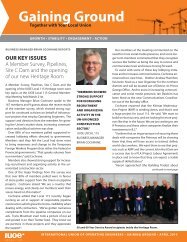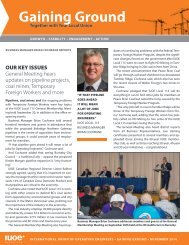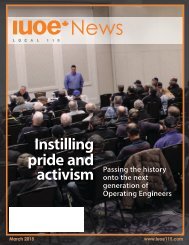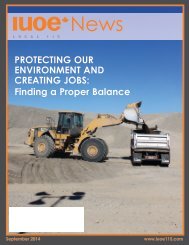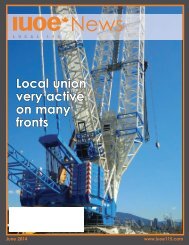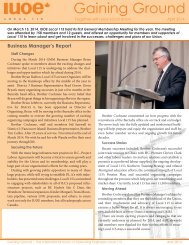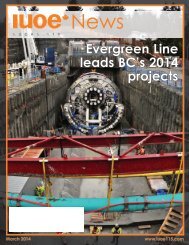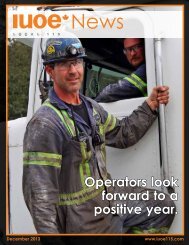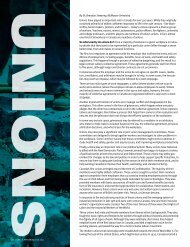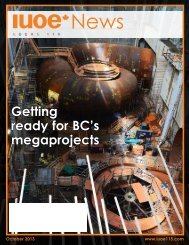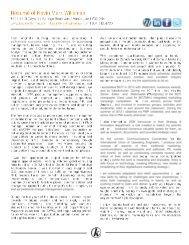IUOE News - Fall 2012
IUOE News - Fall 2012
IUOE News - Fall 2012
Create successful ePaper yourself
Turn your PDF publications into a flip-book with our unique Google optimized e-Paper software.
Focus on Line Creek Mine<br />
Safety work and<br />
working safely<br />
Brother Gary Letcher, a light-duty mechanic at<br />
Line Creek Mine since ’82, said the work “puts meat<br />
on the table and the kids through school. So, I have<br />
no complaints.”<br />
Letcher is also the safety chair of the union’s mine<br />
council and co-chair of the company’s Occupational<br />
Health and Safety Committee. While every crew<br />
has a safety rep and shop steward, his committees<br />
are charged with “looking at the bigger picture and<br />
making it a better place to work,” he said.<br />
“I believe we’re just as good, if not safer than<br />
other mines,” he added. “We have our little disagreements<br />
[between the union and the company],<br />
but you move onto the next issue. We don’t hold a<br />
grudge. We’re professional about it. It’s about maintaining<br />
integrity.”<br />
<strong>IUOE</strong> members have to be watchful for wall<br />
failures in the open pit mine and dump failures,<br />
and wary of all the risks associated with working at<br />
height and around large equipment. It’s also a highvoltage<br />
site with 7,200 volts going through the power<br />
lines. Effective communication is essential, Letcher<br />
added, and everyone has to be properly trained.<br />
Line Creek Mine did have a fatality a number<br />
of years ago. A contract driller was pinned under<br />
equipment when it rolled over.<br />
“You have to work at safety every day,” Letcher<br />
said. “Safety is always a work in progress.”<br />
18 <strong>News</strong> September <strong>2012</strong><br />
continued from previous page<br />
Chaisson said the three unions representing the five<br />
mines (<strong>IUOE</strong>, United Mine Workers and Steelworkers)<br />
meet regularly to talk about common concerns and share<br />
strategies.<br />
“The coal industry flip flops every eight to ten years,”<br />
he added. Another economic downturn in 1999 resulted<br />
in the layoff of 80 people, but the recall started after just<br />
two months.<br />
That was not the case in March 2003. The company,<br />
owned by Fording Income Trust, instituted a 50% layoff.<br />
More than 200 people lost their jobs. “Those were very,<br />
very difficult times. We were told it had to make Line<br />
Creek profitable,” said Chaisson, “but I believe liars figure<br />
and figures lie. It hurt everybody, financially and emotionally.”<br />
The union was able to negotiate a voluntary layoff<br />
package with severance pay.<br />
Shortly after, the company name was changed to Elk<br />
Valley Coal Corp. However, in 2004, “Teck Coal bought<br />
out everybody.” It took over ownership of the five mines<br />
in the area and several in Alberta.<br />
By the end of 2005, all employees on the mine’s recall<br />
list had been called back to work. However, Chaisson estimates<br />
that 25% of those who were laid off never returned<br />
and some left the area completely.<br />
By 2006, the coal market was picking up and more<br />
people were being hired.<br />
Even though the world economy took a hit in 2008,<br />
Teck offered its employees profit-sharing and gain-sharing<br />
programs, a trades retention bonus, a physical fitness<br />
program with reimbursements up to $1,000 and an<br />
across-the-board 5% pay raise—all in an effort to prevent<br />
its experienced workers from being lured to the Alberta<br />
oil sands, Chaisson said.<br />
The most recent collective agreement was ratified in<br />
February 2010 and will take the members to 2014. “The<br />
agreement is still top notch in the industry,” Chaisson<br />
added.<br />
One of Chaisson’s “proudest moments” took place in<br />
2000.<br />
<strong>IUOE</strong> members on the Line Creek Mine Rescue Team<br />
were winners in the highly challenging provincial competition<br />
that year. Events reflect the adrenaline-pumping<br />
actions that these teams must be prepared for.<br />
The Sparwood union office acknowledged the team’s<br />
achievement by purchasing a $7,000 defibrillator for the<br />
mine site. Less than six months later, a member collapsed<br />
on the job from a heart attack. The team put the machine<br />
to work and had to hit him three times to get his heart<br />
pumping again. Medical staff at the hospital said the defibrillator<br />
saved his life.







